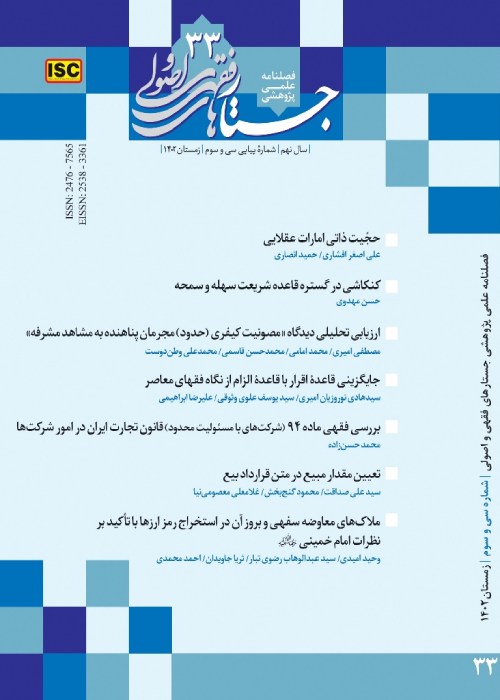Distinguishing the Effect of Ḍamīmah and Inḍimām in Intention of Taqarrub
Author(s):
Article Type:
Research/Original Article (دارای رتبه معتبر)
Abstract:
One of the most challenging topics in the field of ibādāt (worship) is the analysis of the various types of ḍamīmah (attachment) and the rulings of methods of inḍimām (combining) the intention with nīyyah of taqarrub (intention to find proximity to God), which leads to the disruption of the nature of nīyyah (intention) and the denial of correctness in devotional behaviour. This study, which uses an analytical-descriptive method, first, deals with the conceptualization of the intention of qurbah (intention of drawing close to God), and considers the conjective motivation of the expression of servanthood as a criterion for the realization of the nīyyah of worship. Then, it explains the differences between standard and sufficient nīyyah in worship and the purity of intention necessary to attain the perfection of action. Next, it tries to explain the various types of ḍamīmah and the methods of combining (inḍimām) the intention to the nīyyah of taqarrub, and also to validate the views of the fuqahā (jurists) about the rules of ḍamīmah and inḍimām. In fiqhī (jurisprudential) texts, analysis of the ruling of combining the intention of worship general causes which has no inherent contradictions with ikhlāṣ (spiritual devotion), has given rise to views such as, permissibility of such inḍimām and the validity of action, denying the validity of devotional behaviour due to the non-realization of the exclusive and pure sincerity meaning, and detailed view based on methods of inḍimām or preference of ḍamīmah. Some opinions such as just losing the thawāb (reward), the non-necessity of repeating the action, and also the invalidity of devotional acts and the need to perform it anew or make it up have been voiced regarding ḍamīmah intention which is contrary to ikhlāṣ, such as rīyā (pretend virtuousness). The selected theory in this study is based on standard nīyyah in worship which is obtained by analyzing the Qurʾānic and ḥadīthī documents in this field. This view is the opinion of the permissibility of inḍimām and the validity of action in the ḍamīmah of the first type, and the opinion of the invalidity of worship in ḍamīmah of the second type in various styles of inḍimām. Also, in attachment (ḍamīmah) of the intention of other matters which are not in conflict with ikhlāṣ, the opinion of absolute validity is accepted by refinement of the basis of a ruling.
Keywords:
Language:
Persian
Published:
The Research Journal Fighi & Usuli Research, Volume:7 Issue: 4, 2021
Pages:
161 to 194
magiran.com/p2360207
دانلود و مطالعه متن این مقاله با یکی از روشهای زیر امکان پذیر است:
اشتراک شخصی
با عضویت و پرداخت آنلاین حق اشتراک یکساله به مبلغ 1,390,000ريال میتوانید 70 عنوان مطلب دانلود کنید!
اشتراک سازمانی
به کتابخانه دانشگاه یا محل کار خود پیشنهاد کنید تا اشتراک سازمانی این پایگاه را برای دسترسی نامحدود همه کاربران به متن مطالب تهیه نمایند!
توجه!
- حق عضویت دریافتی صرف حمایت از نشریات عضو و نگهداری، تکمیل و توسعه مگیران میشود.
- پرداخت حق اشتراک و دانلود مقالات اجازه بازنشر آن در سایر رسانههای چاپی و دیجیتال را به کاربر نمیدهد.
In order to view content subscription is required
Personal subscription
Subscribe magiran.com for 70 € euros via PayPal and download 70 articles during a year.
Organization subscription
Please contact us to subscribe your university or library for unlimited access!



